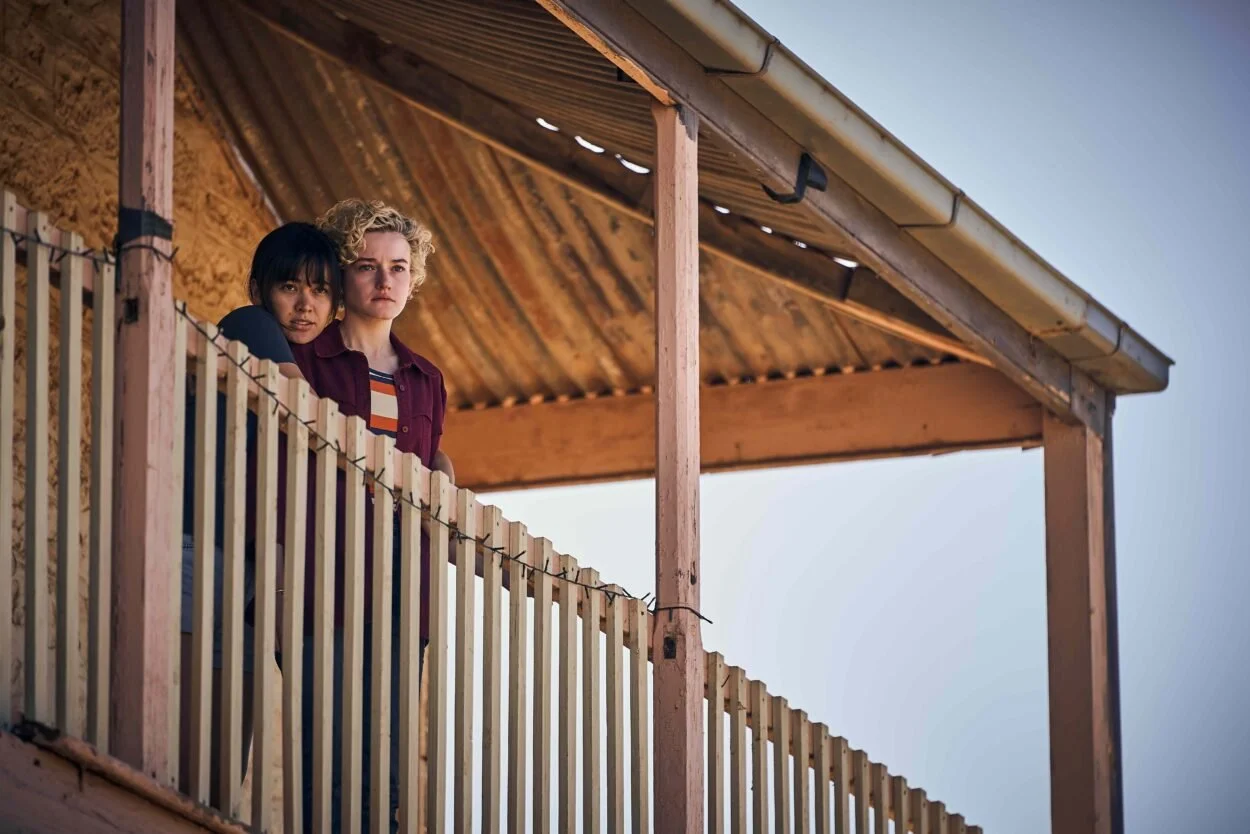“The Royal Hotel” - Film Review
This review was originally posted on Film Obsessive.
Based on the title alone, The Royal Hotel sounds like it could be a whimsical follow-up to The Grand Budapest Hotel. However, the barren, dusty Australian mining town of The Royal Hotel is a far cry from the beautifully manicured world of Wes Anderson’s majestic hotel in the fictional Eastern European country of Zubrowka. The Royal Hotel is named for a small bar in the Australian Outback that caters exclusively to miners who work nearby. It’s isolated and lonely, with the same people coming in every single day. For Hanna (Julia Garner) and Liv (Jessica Henwick), the bar is a bit of a culture shock. They’re American tourists who are traveling through Australia, working odd jobs to sustain their partying. When their funds run out, they accept a job at the Royal Hotel, but the longer they’re there, the more unsettled they become by the bar’s patrons.
Like director/co-writer Kitty Green’s narrative feature debut (also starring Garner), The Assistant, The Royal Hotel is a distinctly women-focused story that looks at the power dynamics at play in a place of work. The Assistant was set in the glossy world of film production and is loosely based on stories of abuse by Harvey Weinstein. The Royal Hotel, however, looks at the restaurant industry and expands its scope to the experiences of solo (or duo) female travelers in foreign countries.
Every traveler knows the feeling of uncertainty that comes with a new place. Unfamiliar surroundings, languages, and customs all play into a general sense of unease. While Liv and Hanna don’t have to worry about language barriers, they’re acutely aware of their place as outsiders and young women in this locale that is primarily made up of men and locals. The film’s only other female characters are Carol (Ursula Yovich), the older woman who runs the kitchen, and two English women who had jobs at the bar before Liv and Hanna.
Jessica Henwick and Julia Garner in The Royal Hotel. Photo: courtesy Neon.
Green has mastered creating tension and examining the very real threats women face without resorting to showing explicit scenes of violence. The audience knows there’s something wrong in The Royal Hotel. They can intrinsically feel the terror of being in this situation, where young women are isolated from any sort of meaningful support system. Hanna and Liv are just trying to work a job while facing an almost constant barrage of sexist comments thrown at them. They’re told to smile more, show a little more cleavage, learn how to take a joke, go on dates with anyone who asks. Maybe then they’d get some better tips. Because these women are working, the patrons feel a sense of entitlement. It’s a feeling that’s not unique to fictitious stories.
The Royal Hotel is much more explicit than The Assistant in its unsettling terror, showing the audience a few scenes of violent outbursts from the patrons of the bar. One scene in particular that shows Dolly (Daniel Henshall), a regular, and Hanna virtually alone in the bar at last call is chill-inducing. It’s excruciating to watch Hanna put up with Dolly’s harassment because she’s more afraid of what he could do than what he’s already doing. That’s a reality many women face daily. They placate to stay safe, to not disturb the peace, just so they can survive. What makes The Royal Hotel so entrancing and frustrating is that the horrors of the film are the events of just another Tuesday for many women around the world. Their lives are like a powder keg that’s one small spark away from blowing the whole world down to the ground.
Jessica Henwick and Julia Garner in The Royal Hotel. Photo: courtesy Neon.
Green comes from a background of documentary films, and it shows in her camerawork. No matter what, Green follows Liv and Hanna. There are few moments when they’re not at the center of the screen, and the camera feels unobtrusive in a verité style. Even though it’s fictitious, the script has roots in true events and can be viewed as an exposé on work travel programs. While some might have merit, others can be predatory and abuse the labor of traveling workers who have limited support.
The Royal Hotel is a horror movie, but not in a supernatural or otherworldly way. Maybe that’s what makes it so creepy. The tension, fear, and confusion of Hanna burrow under the audience’s skin because this experience is not too far-fetched to believe. The audience doesn’t have to think about the intricacies of what monsters can and cannot do because the monster here is mankind. They know what humans are capable of, and that’s more frightening than any paranormal entity someone could cook up.
Follow me on BlueSky, Instagram, Letterboxd, & YouTube. Check out Movies with My Dad, a new podcast recorded on the car ride home from the movies.


